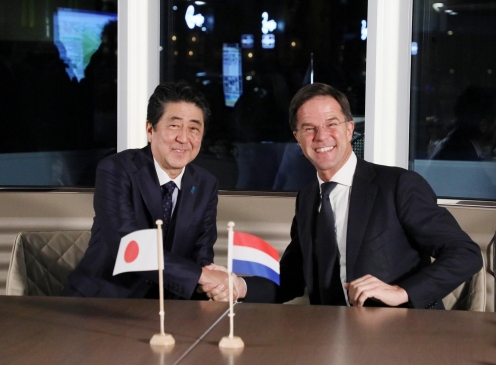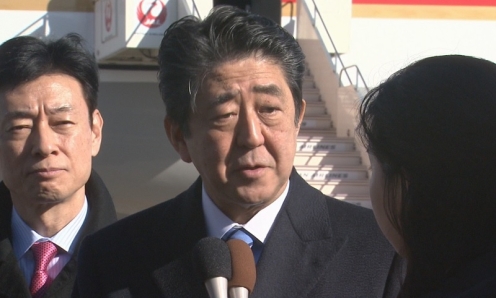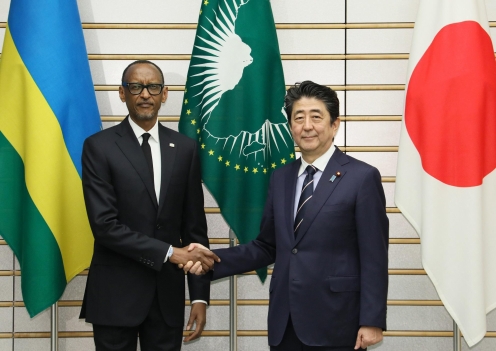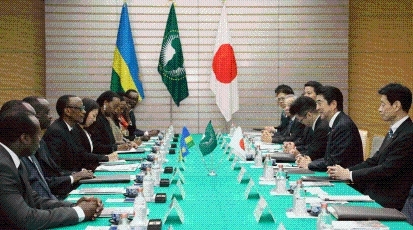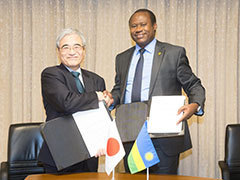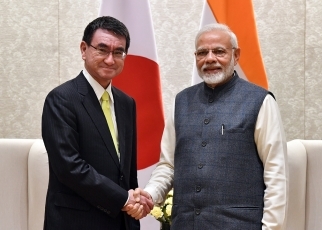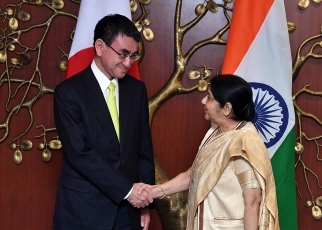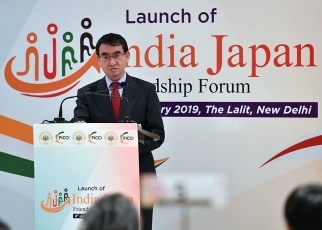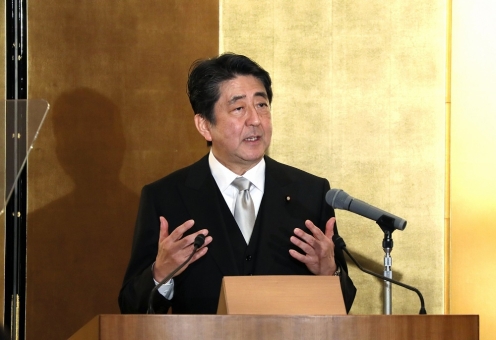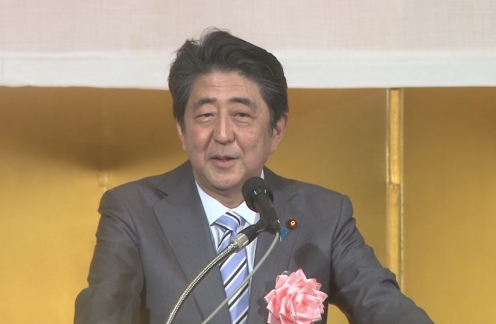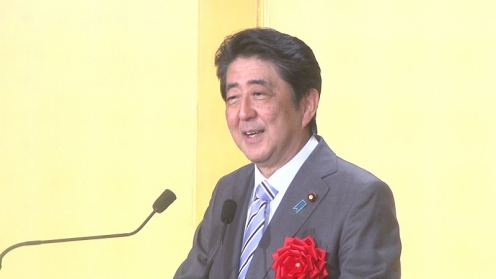Visit to the United Kingdom
Cabinet Secretariat, Thursday, January 10, 2019
[Provisional Translation]
On January 10, 2019 (local time), Prime Minister Shinzo Abe visited London in the United Kingdom of Great Britain and Northern Ireland.
The Prime Minister toured a special exhibition on Japanese rugby, watched a children’s rugby tournament, and interacted with local children.
In the afternoon, Prime Minister Abe attended a salute and guard of honor ceremony, before holding a meeting with the Rt Hon Theresa May MP, Prime Minister of the United Kingdom of Great Britain and Northern Ireland. Afterwards, the leaders held a joint press conference and issued a UK-Japan Joint Statement.
Visit to the Netherlands
Cabinet Secretariat, Wednesday, January 9, 2019
[Provisional translation]
On January 9, 2019 (local time) Prime Minister Shinzo Abe visited the Kingdom of the Netherlands.
The Prime Minister held a meeting with H.E. Mr. Mark Rutte, Prime Minister of the Kingdom of the Netherlands. Thereafter, Prime Minister Abe received a welcome from the Netherlands Marine Corps, held a joint press conference with Prime Minister Rutte and then attended a dinner hosted by Prime Minister Rutte.
The Prime Minister said in his address at the dinner,
“Prime Minister Rutte, I express my heartfelt thanks to you for hosting this dinner tonight. During my meeting with Prime Minister Rutte aboard a ship, we held an extremely meaningful exchange of views and discussion. Now, I would like to relax and enjoy this delicious cuisine.
At long last, the Japan-EU Economic Partnership Agreement is soon entering into force. Afterwards, we will have access to these wonderful Dutch ingredients being served here this evening, as well as Dutch products, at lower prices than before.
An exhibition on Johannes Vermeer has been held in Japan since last October. 500,000 people have already visited this exhibition. It is so popular that there is always a long queue of people waiting to get in, despite the implementation of a timed entry system. For that reason, I have yet to visit the exhibition myself, but I will certainly do so if the opportunity presents itself.
This year, the first Imperial succession from a living Emperor will take place in Japan in nearly 200 years, marking the start of a new era. It is my heartfelt wish that the friendship between Japan and the Netherlands, as symbolized by the close relations between the Imperial Family and the Royal Family, will grow even deeper.
In 2020, Tokyo will host the Olympic and Paralympic Games. When the Olympic and Paralympic Games were previously held in Tokyo in 1964 – I was only 10 years old at that time – I was certain Japan would win the gold medal in judo for all classes. I still vividly remember even now when Geesink defeated Kaminaga and won the gold. At the time, I was amazed by how large the Dutch people were. I expect we will see great things from the Dutch team in 2020. Dutch athletes are expected to perform well in competitions such as swimming, cycling and sailing. Furthermore, we are scheduled to welcome the Olympians from the Netherlands at one of the “Host Towns” in Japan.
Last but not the least, I would now like to offer a toast to the good health of Prime Minister Rutte and everyone in attendance, as well as to the further development of the relationship between our two countries.”
Press Conference on the Visit to the Netherlands and the United Kingdom
Cabinet Secretariat, Wednesday, January 9, 2019
[Provisional Translation]
On January 9, 2019, Prime Minister Shinzo Abe held a press conference at Tokyo International Airport (Haneda Airport).
Regarding his visit to the Netherlands and the United Kingdom, the Prime Minister said,
“I will be making this visit as the Prime Minister as well as the Chair of the G20 Osaka Summit. I would like to hold a series of exchanges of views with Prime Minister Rutte of the Netherlands and Prime Minister May of the United Kingdom regarding a range of issues, including the global economy, trade, and other global issues, and confirm cooperation towards a successful G20 Summit.
The world’s eyes are focused on the exit of the United Kingdom from the European Union (EU). The U.K. Parliament will resume deliberations this week and hold a vote next week. There is great significance to visiting the United Kingdom and exchanging views regarding this issue. I intend to fully communicate the views of Japan and have a discussion with Prime Minister May.”
Japan-Rwanda Summit Meeting and Other Events
Cabinet Secretariat, Tuesday, January 8, 2019
[Provisional Translation]
On January 8, 2019, Prime Minister Shinzo Abe held a summit meeting and other events with H.E. Mr. Paul Kagame, President of the Republic of Rwanda , at the Prime Minister’s Office.
The two leaders attended a salute and guard of honor ceremony, followed by a summit meeting. Afterwards, the leaders held a signing ceremony and a joint press announcement.
Japan-Rwanda Summit Meeting
Foreign Affairs, Tuesday, January 8, 2019
On January 8, commencing at 6:15 p.m. for approximately one hour, Mr. Shinzo Abe, Prime Minister of Japan, held a summit meeting with H.E. Mr. Paul Kagame,President of the Republic of Rwanda, who was on his Official Working Visit to Japan. The overview of the summit meeting is presented below.
Following the summit meeting, Mr. Takayuki Miyashita, Ambassador of Japan to the Republic of Rwanda, and Hon. Dr. Richard Sezibera, Minister of Foreign Affairs and International Cooperation of the Republic of Rwanda, signed the Exchange of Notes in the presence of the two leaders on a grant aid project for improving the water supply situation in Kigali City, “the Project for Strengthening of Nzove-Ntora Water Principal Pipeline in Kigali City.” Subsequently the two leaders held a joint press occasion. Prime Minister Abe and Mrs. Abe then hosted a dinner, where the two leaders discussed a broad range of topics relating to the bilateral relations. In this visit, the two leaders issued a Joint Statement between Japan and the Republic of Rwanda .
1. Opening remarks
(1) Prime Minister Abe stated that this was their third summit meeting and that he would like to further deepen the partnership existing between the two countries that share fundamental values and have exchanged experiences in a wide range of fields in the public and private sectors. Prime Minister Abe expressed his gratitude for Rwanda’s proactive contribution to the Tokyo International Conference on African Development (TICAD) process and expressed his hope for President Kagame’s attendance in TICAD7, hich will be held in Yokohama City in August this year, and further collaboration for TICAD7.
(2) In response, President Kagame expressed his gratitude for Japan’s invitation and his intention to make this visit to Japan as an opportunity to strengthen cooperation with Japan both in bilateral and in international arenas and to further enhance the relationship between the two countries. President Kagame also affirmed his attendance in TICAD7 and Rwanda’s contribution to the success of TICAD7.
2. Bilateral relations
(1) Support for the sustainable development of Rwanda
Prime Minister Abe highly praised President Kagame’s initiatives in areas such as economic development, national reconciliation, and combatting corruption. In addition, Prime Minister Abe expected that the implementation of the grant aid project to be signed on this day would improve the water supply situation in Kigali City, and stated that Japan would continue to support the economic growth of Rwanda through public-private partnership. In response, President Kagame expressed his gratitude for Japanese assistance in the fields of agriculture, ICT, infrastructure, human resource development including the ABE initiative, peacebuilding including PKO, and contribution to Africa’s development through TICAD process.
(2) Cooperation in the economic field
Prime Minister Abe welcomed the increase in the number of Japanese companies in Rwanda from 3 four years ago to 24, thanks to President Kagame’s initiatives for improving the investment and communication environments as well as human resources development. Mentioning the Public and Private Sector Joint Mission for Promoting Trade and Investment in Africa, which was dispatched in July last year, and the JETRO Seminar, which would be held on January 9, Prime Minister Abe expressed his hope for developing concrete business projects.
3. Regional affairs and strengthening cooperation in the international fora
The two leaders exchanged their views on global issues such as United Nations Security Council reform as well as regional affairs including North Korea issues.
Signing of Grant Agreement with Rwanda: Contributing to a stable water supply and better social services through improving the water supply facilities in Kigali
JICA, Wednesday, January 9, 2019
On January 9, the Japan International Cooperation Agency (JICA) signed a grant agreement with the Government of the Republic of Rwanda to provide grant aid of up to 3.191 billion yen for the Project for Strengthening Nzove - Ntora Principal Water Transmission Pipeline in Kigali City.
Under this project, the largest water transmission pipeline in Kigali, the capital city, will be improved along with pump equipment and a water reservoir with the aim of improving social services through improved access to a stable supply of water and stable water services. The project is expected to benefit about 440,000 people in Kigali.
Details for the project are as below.
[Basic project information]
Country
Republic of Rwanda
Project title
The Project for Strengthening Nzove-Ntora Principal Water Transmission Pipeline in Kigali City
Planned implementation period
35 months, including detailed design work and the bidding period
Executing agency
Water and Sanitation Cooperation
Target region, facilities
Kigali
Specific project details (provisional)
(1) Facility construction
The construction of a water transmission pipeline (9.4 kilometers), three pumps in a water treatment plant, and an elevated water tank
(2) Consulting services
Detailed design work, bidding assistance, construction supervision, (as guidance in managing the facilities) guidance in operating, maintaining and managing the water reservoir, pump operation training, others
Foreign Minister Kono Pays a Courtesy Call on H.E. Mr. Narendra Modi, Prime Minister of India
Foreign Affairs, Monday, January 7, 2019
On January 7th, from 8:10 PM (local time, 11:40 PM January 7th Japan time) for approximately 25 minutes, Mr. Taro Kono, Minister for Foreign Affairs, paid a courtesy call on H.E. Mr. Narendra Modi, Prime Minister of India, during his visit to India. The overview of the meeting is as follows.
At the beginning Prime Minister Modi welcomed Minister Kono’s visit to India and wished his friend, Prime Minister Abe and the people of Japan a happy new year.
Minister Kono stated the following:
(1)It is my pleasure to meet Prime Minister Modi again since his last visit to Japan in October 2018.
(2)India is the most important partner to realize a “Free and Open Indo-Pacific”. With India, Japan would like to play a leading role in promoting peace and prosperity in the region and the world.
(3)This year, Japan will be hosting the G20, and looks forward to the visit by Prime Minister Modi, following his last year’s visit to Japan. It is Prime Minister Abe’s turn to visit India this year for the next Summit meeting, and we would like to coordinate with India to make the visit fruitful.
(4)In order to further promote bilateral security and defence cooperation, Japan hopes for the earliest realization of a 2+2 Ministerial Meeting, the negotiations on the Acquisition and Cross-Servicing Agreement (ACSA), and dialogues on space and cyber. We would like to enhance people-to-people exchange through the India-Japan Friendship Forum.
H.E. Mr. Narendra Modi, Prime Minister of India stated that he looked forward to his attendance at the G20 summit meeting as well as Prime Minister Abe’s prospective visit to India.
Moreover, they exchanged opinions on various topics involving regional situations and shared the view to continue close collaboration.
Japan-India Foreign Ministers’ Strategic Dialogue
Foreign Affairs, Monday, January 7, 2019
Mr. Taro Kono, Minister for Foreign Affairs, held the 10th Japan-India Foreign Ministers’ Strategic Dialogue with H.E. Ms. Sushma Swaraj, Minister of External Affairs of India, during his visit to India, from 6:30PM on January 7th (local time, 10:00PM January 7th Japan time) for approximately 75miniutes. The overview of the meeting is as follows.
1 Introduction
Minister Swaraj stated that she welcomed Minister Kono’s visit to India and was delighted to hold the 10th Japan-India Foreign Ministers’ Strategic Dialogue in Delhi. Minister Swaraj also mentioned that Prime Minister Modi’s visit to Japan in 2018 was a success with many achievements and that this meeting today is the start of Year 2019 to further develop India-Japan relations in various fields.
In response, Minister Kono stated that he was pleased to visit India for the first time as the Foreign Minister and that Prime Minister Modi’s visit to Japan in October last year showcased Japan-India special relations. He went on to say that for Japan, India is the most important partner to realize a “Free and Open Indo-Pacific” and together with India, Japan would like to play a leading role in promoting peace and prosperity in the region and the world.
2 Bilateral Relations
(1) Overview
Minister Kono stated that Japan would host the G20 this year, and look forward to the visits by Prime Minister Modi and Minister Swaraj this year. Also, given that it is Prime Minister Abe’s turn to visit India this year for the next Summit Meeting, Minister Kono expressed his hope to coordinate and work with Minister Swaraj in order to make the year 2019 fruitful in deepening the bilateral relationship.
Minister Swaraj responded that India would support Japan, Chair of the G20.
(2) Security and Defence
Minister Kono stated that in order to further promote bilateral security and defence cooperation, Japan hopes for the earliest realization of a 2+2 Ministerial Meeting, which was confirmed during the last Summit Meeting, within this year and dialogues on space and cyber cooperation.
In response, Minister Swaraj expressed her hope to soon hold a 2+2 Ministerial Meeting as well as dialogues on space and cyber cooperation. She also mentioned the early commencement of negotiations on ACSA, Acquisition and Cross-Servicing Agreement.
(3) Economy
Minister Kono welcomed the signing of Exchange of Notes last December concerning three Yen loan projects. Minister Swaraj expressed her expectation for further investment by Japanese companies in India.
(4) People to People exchange
Minister Kono welcomed the establishment of the India-Japan Friendship Forum, which is represented by leading experts and business leaders in India, and looked forward to further promotion and deepening of people-to-people and cultural exchanges between the two countries.
(5) Connectivity
Towards the realization of the shared vision of a free and open Indo-Pacific, Minister Kono reaffirmed the importance of cooperation in third countries and India’s North Eastern region. The two ministers shared the view to continue to crystalize cooperation especially through Act East Forum.
3 Regional Satiation and Global Challenges
The two ministers exchanged their opinions on regional affairs including the North Korea issues as well as global challenges such as G20, UNSC, Disarmament and Non-Proliferation, and Regional Comprehensive Economic Partnership (RCEP).
Foreign Minister Kono participates in Launching Event of the India-Japan Friendship Forum
Foreign Affairs, Tuesday, January 8, 2019
On January 8th, from 7:25 PM (local time, 10:55 PM January 8th Japan time), Mr. Taro Kono, Minister for Foreign Affairs of Japan, participated in Launching Event of the India-Japan Friendship Forum (IJFF). Attendees included H.E. Mr. Suresh Prabhu, Minister of Commerce and Industry and Civil Aviation of India and young business leaders as well as India's parliamentarians besides members of the IJFF.
At the beginning, Minister Kono gave remarks and welcomed the establishment of the IJFF, which is composed of leading experts and business leaders in India. He also stated that he looked forward to further promotion and deepening of people-to-people and cultural exchanges between the two countries.
(Footnote) India Japan Friendship Forum (IJFF)
The IJFF is chaired by Ms. Deepa Gopalan Wadhwa, former Ambassador of India to Japan, and is composed of experts and business leaders. It aims to promote mutual understanding between India and Japan through arts, culture and intellectual exchanges, enhance understanding of Japan in India, and encourage more people-to-people exchanges between Japan and India.
Japan-Canada Summit Telephone Talk
Foreign Affairs, Tuesday, January 8, 2019
On January 8, commencing at around 11:45 A.M. for approximately 35 minutes, Mr. Shinzo Abe, Prime Minister of Japan, held a summit telephone talk with the Right Honourable Justin Trudeau, Prime Minister of Canada. The overview of the meeting is as follows.
1. Prime Minister Trudeau stated that Canada intends to extend its utmost cooperation to make this year’s G20 Osaka Summit successful, and both leaders shared the recognition that both countries will closely cooperate with a view to sending a robust message at the Summit.
2. Both leaders welcomed the entry into force of the TPP 11 Agreement, and confirmed that Japan and Canada will continue to cooperate towards steady implementation and expansion of the Agreement and establish a free and open economic zone.
3. In addition, Prime Minister Trudeau expressed his concern about the issue of Canadians detained in China. Both leaders reiterated the importance of the rule of law, including in relations to the above-mentioned issue.
New Year’s Press Conference by Prime Minister Shinzo Abe
Cabinet Secretariat, Friday, January 4, 2019
[Provisional Translation]
On January 4, 2019, Prime Minister Shinzo Abe held the New Year’s press conference at Ise Jingu.
2019 New Year Party Jointly Hosted by the Three Economic Associations
Cabinet Secretariat, Monday, January 7, 2019
[Provisional translation]
On January 7, 2019, Prime Minister Shinzo Abe attended the 2019 New Year Party jointly hosted by the three economic associations held in Tokyo.
The Prime Minister said in his address,
“I extend my heartfelt congratulations on the successful holding of this year’s New Year Party hosted by the three economic associations in such a magnificent manner once again this year with the attendance of many people.
We have been enjoying all in all quite nice weather up until today, and it has been a pleasant New Year. On January 4, I paid a visit to Ise Jingu. Two days prior, I played my first round of golf for 2019, and my very first shot was a nice one. My second shot, however, was not so great. This happened to be just when the press was there for coverage, and I believe some people might be thinking my shot was not very good. So I would like to have that corrected. Thanks to my first shot, I was able to achieve my best score for 2019. While some people’s faces seem to be saying that’s to be expected, you can look at your first score as either the best or worst score for the year, and I consider mine to be the best for 2019.
Afterwards, on my way to Ise Jingu, I saw Mt. Fuji distinctly out the window of the Shinkansen for a long while. I have a good inkling about the coming year. The next day, I went back to my hometown for a local New Year party, and on my way to the party’s venue, I saw a splendidly clear rainbow, which was shaped as the most unbelievably perfect gate I have ever seen. I then saw two deer with white bellies strutted across. It is often said that deer are envoys of the Shinto deity, and I believe I can see this as a fortuitous omen.
In today’s news and other reports, a nine-year-old girl had become a pro go player. Last year, Mr. Sota Fujii, professional shogi player, ranked 7-dan. This rise of the young generation, or the emergence of such youthful strength, brightens our future. I truly believe so. In addition, the first tuna auction of this year achieved a price of 300 million yen for a tuna from the town of Oma. While I thought it would be offered as expensive sushi, I was told it will be sold for a price of 200 to 400 yen for one piece. Turning to department stores, their new year sales also drew massive crowds, exceeded 7,500 people in Osaka, 8,500 people in Nagoya, and 10,000 people in Tokyo, and there were also lines.
As there is a saying that business sentiment starts from sentiment, last year marked the fifth year of consecutive wage increases, to achieve the highest levels in this century, owing to your efforts. Thank you so much. This time, I believe we can expect Mr. Nakanishi, who has succeeded Mr. Sakakibara, will exert his effort to this end. Actually, the average for winter bonuses last winter was 930,000 yen, a record high.
As it was touched upon just before, the increase of the consumption tax rate is scheduled this year. I believe it is of utmost necessity for us to strengthen the foundation of our economy. That means instilling our economy with further vigor for growth. We are seeing several economic forecasts that the current recovery of our economy would match the longest period of postwar economy recovery, after exceeding the ‘Izanagi boom.’ The longest economic recovery started during the Koizumi administration, and continued through the first Abe administration, the Fukuda administration, and the Aso administration. What is the biggest difference between that longest economic recovery – it included one year of the first Abe administration and I run my administration based on the lessons learned at that time-- and this time? Needless to say, the range of the growth is different. As we have created a situation that is not deflation, the nominal GDP has grown by five times. Here is the biggest difference. According to the Short-Term Economic Survey of Enterprises in Japan (Tankan) of the Bank of Japan (BoJ), it was only in the Kanto and Tokai regions where business sentiment was positive throughout the previous postwar economic recovery. For example, in Hokkaido and Shikoku, business sentiment was negative throughout this period. Meanwhile, in the case of the current economic recovery, business sentiment has been positive in all regions and conditions got better throughout Japan over the last five years. I believe this is the reason that the ratio of active job openings to applicants has exceeded 1.0 for all 47 prefectures. In addition, jobs were created for one million people during the previous recovery. This time, over three million jobs have been created. With polishing innovative technologies and surely investing in areas we should invest in, wages increase, consumption increases, investment also increases, and tax revenue increases. By allocating that for investment or solidifying the basis of social welfare, people can work hard with a peace of mind. We would like to create this virtuous economic cycle. Regarding the consumption tax, we will implement thorough measures based on the lessons learned from the decrease in consumption caused by the previous increase of three percent. I hope that we will overcome the increase of the consumption tax and ensure the exit from deflation by implementing a series of countermeasures at the level of returning the full amount of the incremental tax revenue or even possibly more.
This year is the Year of the Boar. The previous Year of the Boar twelve years ago was also the time of the Abe administration, while I have not been Prime Minister the entire time since then; I took a five-year break. I was certainly young back then. Looking back at the New Year’s reflection I made at that time, I said, as it was the year of the boar, I would unfalteringly lead the way ahead toward the creation of a beautiful country. There is an expression in Japanese meaning “to dash ahead without hesitation like a boar (chototsu-moshin).” While boars have that image, they actually carry themselves with great resilience. If there are obstacles, they will quickly change direction to avoid them. They occasionally make quick U-turns and continue moving forward. After twelve years, that is the difference in terms of managing the administration, which has changed from my previous one. This year, I will humbly manage the administration, all the while having a flexible and tolerant mindset. In this final year of the Heisei period, and the inaugural year of a new era, we will grow our economy, managing the administration firmly. In addition, I would like to overcome the difficult international circumstances. In closing, I wish you a brilliant year to come. Once again, my sincere congratulations.”
Jiji Press New Year Party
Cabinet Secretariat, Monday, January 7, 2019
[Provisional Translation]
On January 7, 2019, Prime Minister Shinzo Abe attended the Jiji Press New Year Party held in Tokyo.
The Prime Minister said in his address,
“I extend my congratulations for the successful holding of the Jiji Press New Year Party in such a magnificent manner once again this year with the attendance of many people.
I just shook hands with President Omuro as if we were taking a poster photo for the election campaigns. If President Omuro wishes to, I hope he will run for a proportional representation seat.
This year is the final year of the Heisei period and the dawn of a new era. We have been enjoying all in all quite nice weather up until today and it has been a pleasant New Year. As I visited Ise Jingu on January 4 and saw Mt. Fuji distinctly out the window of the Shinkansen, I had a good inkling about the coming year in the beginning of this New Year. Afterwards, I returned to my hometown and attended a New Year party there. On my way to the party venue, I saw an arc of a rainbow distinctly. Furthermore, while I was looking at the rainbow, two deer strutted across, as if they were envoys of the Shinto deity. When I was telling someone in my hometown about how great it was to see deer that day, he said, ‘Mr. Abe, the deer have been a nuisance for us.’ While being asked to get rid of them as “harmful animals,” I thought it should have been a precious opportunity to see them. Anyway, I hope that it will be a great year. At Ise Jingu, I prayed for peace in Japan and the Imperial Family to flourish in this historic year, which will see the succession to the Imperial throne and Japan’s first hosting of the G20 Summit (Summit on Financial Markets and the World Economy).
This year is the Year of the Boar. The year is said to be a tough one to hold an election. This is because the nationwide local elections and the House of Councillors elections are held. While I touched upon this year would be a good year just before, the press coverage is already all about the elections. The year of the boar 12 years ago regrettably saw a disappointing outcome for the Abe administration. To begin with, I feel I was also young at the time. I read my New Year’s address at that time, which stated that like a boar, I would unfalteringly lead the way ahead toward the creation of a beautiful country. I sound so youthful. It turns out after careful examination that a boar is not such a simple animal. There is an expression in Japanese meaning “to dash ahead without hesitation like a boar (chototu-moshin).” Boars can reach 50 kph when they break into a run, but if obstacles are in their way, they will skillfully avoid them; they also carry themselves with such resilience. If it appears that they will face difficult places, they will make a U-turn and advance from a different path. The difference between now and 12 years ago is that I have acquired this knowledge. This year, I will manage the administration with humbleness, all the while having a flexible and tolerant mindset. I see from the change in Chief Representative Yamaguchi’s facial expression that my last comment has brought him relief somewhat.
Over the past six years, I have worked on economic issues as the highest priority. I am pleased to say that the current recovery of the Japanese economy has exceeded ‘Izanagi boom’ to match the longest period of postwar economic recovery and is said to exceed it. The previous longest period of postwar economic recovery began during the Koizumi administration, continued through the Abe administration and the Fukuda administration, and lasted until the Aso administration. Including my time, that economic recovery did last a long time. Indeed, I have taken into account the lessons in advancing an economic policy comprised of a set of three arrows. Between the previous and current recoveries, there are several differences. First, as we have created a non-deflationary condition this time, nominal GDP has grown by five times in the six years of the previous recovery. It has grown by 10.9%. This is a fivefold growth from the previous recovery when it was just over 2%. In addition, jobs have been created. During the previous recovery, I believe jobs were created for one million people. This time, over three million jobs have been created. The biggest difference is that the previous economic recovery was extremely skewed. According to the Short-Term Economic Survey of Enterprises in Japan (Tankan) of the Bank of Japan (BoJ), it was only in the Kanto and Tokai regions where business sentiment was positive throughout the entire previous economic recovery period. For example, in Hokkaido and Shikoku, business sentiment was negative throughout this period. Meanwhile, in the case of the current economic recovery, business sentiment has been positive in all regions over the last five years. I believe this is the reason that the ratio of active job openings to applicants has exceeded 1.0 for all 47 prefectures. This year, I would like to strengthen this economic growth much further, rather than maintain it as well as increase productivity and steadily promote innovations.
Furthermore, the Trans-Pacific Partnership (TPP) 11 (Comprehensive and Progressive Agreement for Trans-Pacific Partnership) has entered into force, and the Economic Partnership Agreement (EPA) between Japan and the European Union (EU) will also enter into force this year. I can see Ambassador Cheng Yonghua—Japan also hopes to work with China to reach an agreement on the Regional Comprehensive Economic Partnership (RCEP). Japan will fulfill the role of a standard bearer for free trade, and in this sense, from the viewpoint of the G20 Presidency, I believe this year’s G20 Summit will be extremely critical.
Under such circumstances, speaking on elections, we are often seeing speculation among the press that a ‘double election*’ may be called. I would like to stress that this is not even in the back of my head. I have consistently made the same comment over the last six years. Then, some note that I have actually called general elections twice despite my comments over the six years that elections are not even in the back of my mind. Let me state that, this time, a double election is nowhere in my mind. A year after since the previous party, I still believe that we want to secure victory in the House of Councillors election by confidently carrying out solid policy debates.
In this year’s Diet session, we will submit a series of bills to materialize tuition-free childhood education as well as a series of bills to introduce tuition-free higher education next year. I intend to make this year a cornerstone for advancing a series of reforms, transition to a social security system oriented to all generations.
The Year of the Boar 60 years ago was exactly the time of the Kishi administration. At that time, the negotiations to revise the Japan-U.S. Security Treaty were at their climax. Furthermore, 60 years ago was the year that laid the foundation of the social security system by passing the Minimum Wage Act and the National Pension Act. In this regard, I hope to establish a solid foundation during the year of this zodiac. I would like to close my remarks by wishing everyone a brilliant year to come. Thank you very much.”
* Joint election of the House of Representatives and the House of Councillors
Regional Economic Report (Summary) (Jan. 2019)
Bank of Japan, Thursday, January 10, 2019
This report summarizes the reports from all regional research divisions, mainly at the Bank's branches in Japan, and is based on data and other information gathered for the meeting of general managers of the Bank's branches held today. The English translation is based on the Japanese original.
January 10, 2019
Bank of Japan
According to assessments from regions across Japan, all nine regions reported that their economy had been either expanding or recovering. Compared with the previous assessment in October 2018, the Hokkaido and Chugoku regions, which had revised down their assessments due to the effects of the natural disasters -- namely, the 2018 Hokkaido Eastern Iburi Earthquake and the heavy rain in July 2018 -- revised up their assessments, taking into account the progress in restoration and reconstruction. The assessments for the other seven regions (Tohoku, Hokuriku, Kanto-Koshinetsu, Tokai, Kinki, Shikoku, and Kyushu-Okinawa) were unchanged.
The background behind these assessments was that the virtuous cycle from income to spending had been maintained, as exports had been on an increasing trend with overseas economies continuing to grow firmly on the whole, labor market conditions had continued to tighten steadily, and private consumption had been increasing moderately. Although the impact of uncertainties regarding overseas economies -- including the trade friction between the United States and China -- has been limited thus far, a gradually increasing number of firms are pointing to some effects, such as a decline in orders.
Please check full content using source link.




























